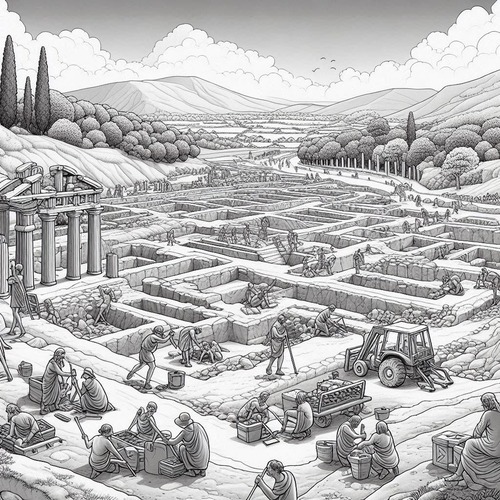Divine Fingerprints on Ancient Parchment—The Dead Sea Scrolls
Qumrun’s Hidden Library: A Testament to Divine Providence
The Dead Sea Scrolls, discovered between 1947 and 1956 near the Dead Sea, are more than mere archaeological treasures. They are a testament to God’s sovereign hand guiding history, preserving His Word, and strengthening faith across millennia. The divine fingerprints on the ancient parchment may be traced right from the Scrolls’ inception to their eventual discovery, and reveal God’s intricate plan to validate His Word and draw people to Himself.
Commissioning and Financing: A Divine Calling
The Essenes, a devout Jewish sect, felt compelled to undertake the monumental task of copying and preserving sacred texts. This calling, seemingly beyond their means, was fuelled by unwavering commitment to God’s Word. The immense resources required—skilled scribes, expensive materials, and secure storage—far exceeded what a small, ascetic community could typically afford. Yet, they persevered, driven, as it were, by divine mandate. When God commissions a task, He also provides the means to accomplish it.
Writing and Storing: Guided by Providence
The divine fingerprints on ancient parchment also tell us of the scribes’ meticulous care in copying these texts and of the divine inspiration that moved them, ensuring accurate transmission of the Word. The decision to store these documents in remote caves was also a strategic choice, guided no doubt by God’s foresight of future needs.
Miraculous Preservation: Nature and Divine Will in Concert
The preservation of the Dead Sea Scrolls for over two millennia is nothing short of miraculous. The precise combination of the Judean Desert’s arid climate, the scrolls’ careful storage in sealed jars, and their placement in caves created ideal preservation conditions. This “coincidence” of factors demonstrates God’s intricate planning. He ensured His Word, and the divine fingerprints on ancient parchment, would survive intact—to be revealed at the appointed time.
The preservation extended beyond mere physical integrity. The scrolls’ content remained remarkably consistent with later biblical texts, providing evidence of God’s faithfulness in preserving His Word throughout history. This consistency serves as a resounding testimony to the Bible’s divine origin and inerrancy.
Divine Timing: A Perfect Moment in History
The discovery of the Dead Sea Scrolls in the mid-20th century was no accident. It coincided with a rising tide of scepticism towards Bible reliability, and provided crucial evidence to counter critical theories just when it was most needed. This timing showcases God’s perfect orchestration of events, using these ancient parchments to reinforce faith in Scripture’s accuracy at a critical juncture in modern history.
Moreover, the scrolls’ discovery aligned with advancements in archaeology and textual analysis, allowing for their proper study and interpretation. This convergence of factors further highlights the divine fingerprints on these ancient parchments, revealing God’s foresight in timing their revelation for maximum impact.
Prophetic Fulfilment: God’s Word Endures
The preservation and discovery of the Dead Sea Scrolls may be seen as a fulfilment of Bible promises. Isaiah 40:8 declares, “The grass withers and the flowers fall, but the word of our God endures forever.” The scrolls’ survival and impact serve as a tangible manifestation of this promise, demonstrating God’s faithfulness across millennia.
Spiritual Revival: Igniting Faith and Scholarship
The impact of the Dead Sea Scrolls extends far beyond academic circles. Their discovery has reignited interest in Scripture. The scrolls have:
- Strengthened faith by confirming the reliability of biblical texts.
- Enhanced understanding of the historical and cultural context of the Bible.
- Inspired new generations of scholars and believers to engage with Scripture.
- Provided a tangible connection to the ancient world of the Bible, making faith more accessible to modern seekers.
Conclusion: A Testament to Divine Providence
The journey of the Dead Sea Scrolls—from their creation by devoted scribes to their miraculous preservation and timely discovery point unmistakably to divine providence. Each step of this journey reveals God’s sovereign control over history, using both natural conditions and human efforts to preserve and validate His Word.
For believers, the Dead Sea Scrolls stand as a powerful reminder of God’s faithfulness and the enduring nature of His Word. They challenge us to approach Scripture with renewed reverence and to trust in God’s ability to preserve His truth through the ages. As we study these ancient texts, we are invited to trace the divine fingerprints on ancient parchment, marvelling at the intricate ways God works to strengthen our faith and draw us to Himself.
The Dead Sea Scrolls are thus more than historical artefacts—they are a testament to God’s enduring love and His commitment to communicating with humanity across the ages. They invite us to see our own lives as part of this grand narrative, where God continues to leave His divine fingerprints on the parchments of human history.
Related FAQs:
- How did the Essenes afford to create and preserve the Dead Sea Scrolls? While the resources required were immense, the Essenes’ unwavering commitment to God’s Word drove them to persevere. This demonstrates that when God commissions a task, He also provides the means to accomplish it.
- What factors contributed to the miraculous preservation of the Dead Sea Scrolls? The scrolls were preserved through a combination of the Judean Desert’s arid climate, careful storage in sealed jars, and placement in caves. This precise combination of factors points to God’s intricate planning in ensuring His Word would survive intact.
- Why is the timing of the Dead Sea Scrolls’ discovery significant? The scrolls were discovered in the mid-20th century, coinciding with rising skepticism towards biblical reliability. This timing provided crucial evidence to counter critical theories, showcasing God’s perfect orchestration of events to reinforce faith in Scripture’s accuracy.
- How do the Dead Sea Scrolls fulfil Bible prophecy? The preservation and discovery of the Dead Sea Scrolls fulfil the promise in Isaiah 40:8 that God’s word endures forever. Their survival and impact demonstrate God’s faithfulness across millennia.
- What impact have the Dead Sea Scrolls had beyond academic circles? The Dead Sea Scrolls have reignited interest in Scripture, strengthened faith by confirming biblical reliability, deepened understanding of the Bible’s historical context, and inspired new generations to engage with Scripture.
- Where can I see the Dead Sea Scrolls today? Many of the Dead Sea Scrolls are housed in the Shrine of the Book at the Israel Museum in Jerusalem. Digital versions are available online through the Israel Museum’s Digital Dead Sea Scrolls project and the Leon Levy Dead Sea Scrolls Digital Library. To view digital versions of the Dead Sea Scrolls, visit:
Related Reads:
Editor's Pick

From Empty to Overflow: The Abundant Life Jesus Promised
(AND WHY YOU SHOULDN’T SETTLE FOR LESS) We're surviving, but are we thriving? If we're honest, there's a gap between [...]

What Does Jesus Save Us From?
THREE BIBLE TRUTHS ABOUT SALVATION "Jesus saves." We’ve seen it on bumper stickers, heard it shouted at sporting events, maybe [...]

If God Wants Everyone Saved, Why Aren’t They?
THE REFORMED VIEW ON GOD’S DESIRE VS HIS DECREE The question haunts every believer who has lost an unbelieving loved [...]

The One Man Mystery in Acts 17:26: Is It Adam Or Noah?
When the Apostle Paul stood before the philosophers at Mars Hill, he delivered an insightful statement about human unity: “And [...]

Megiddo Or Jerusalem: Where Did King Josiah Die?
Recent archaeological discoveries at Tel Megiddo continue to reveal evidence of Egyptian military presence during the late 7th century BC, [...]

Losing Your Life Vs Wasting It: How Are the Two Different?
AND WHY DID JESUS PRAISE THE FORMER? Jesus spoke one of the most perplexing statements in Scripture: “For whoever wants [...]

Can Christians Be Demon Possessed? What the Bible Teaches
Perhaps you’ve witnessed disturbing behavior in a professing Christian, or you’ve struggled with persistent sin and wondered if something darker [...]

Sacred Fury: What Christ’s Temple Cleansing Truly Means
Mark 11 records the crack of a handmade whip that echoed through the temple corridors. Tables crashed to the ground, [...]

Did Jesus Cleanse the Temple Twice?
OR DID JOHN DISAGREE WITH THE SYNOPTICS ON TIMING? One of sceptics’ favourite "gotcha" questions targets what they see as [...]

Self-Authentication: Why Scripture Doesn’t Need External Validation
"How can the Bible prove itself? Isn't that circular reasoning?" This objection echoes through university classrooms, coffee shop discussions, and [...]
SUPPORT US:
Feel the Holy Spirit's gentle nudge to partner with us?
Donate Online:
Account Name: TRUTHS TO DIE FOR FOUNDATION
Account Number: 10243565459
Bank IFSC: IDFB0043391
Bank Name: IDFC FIRST BANK






